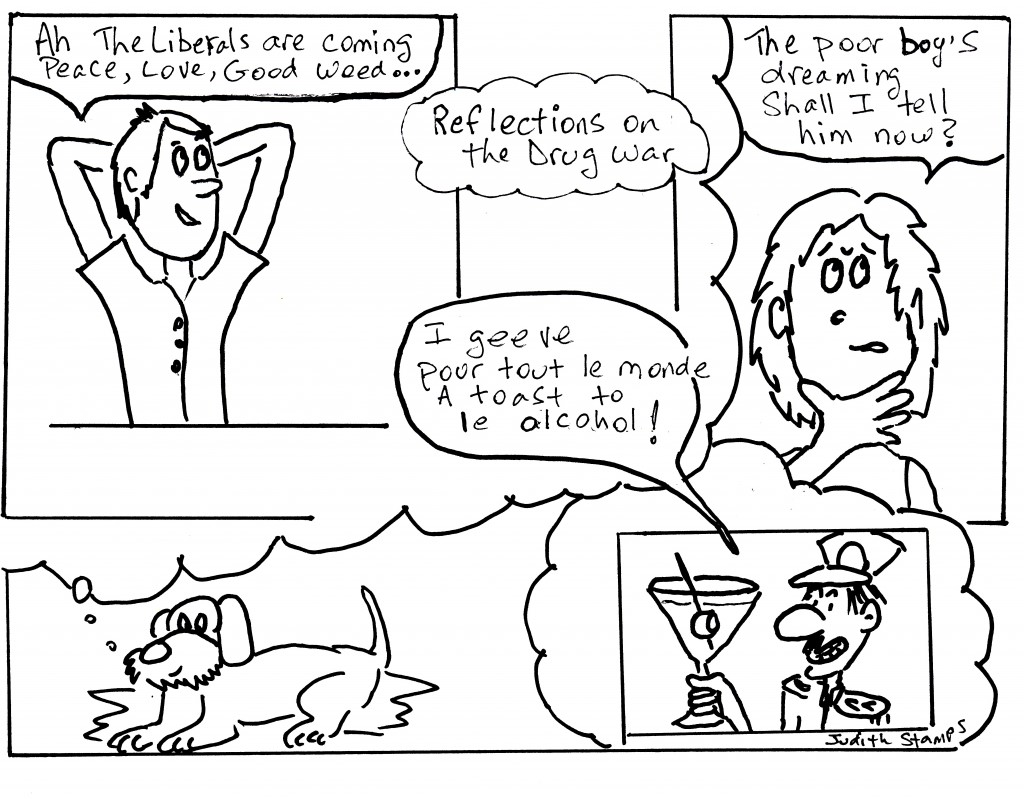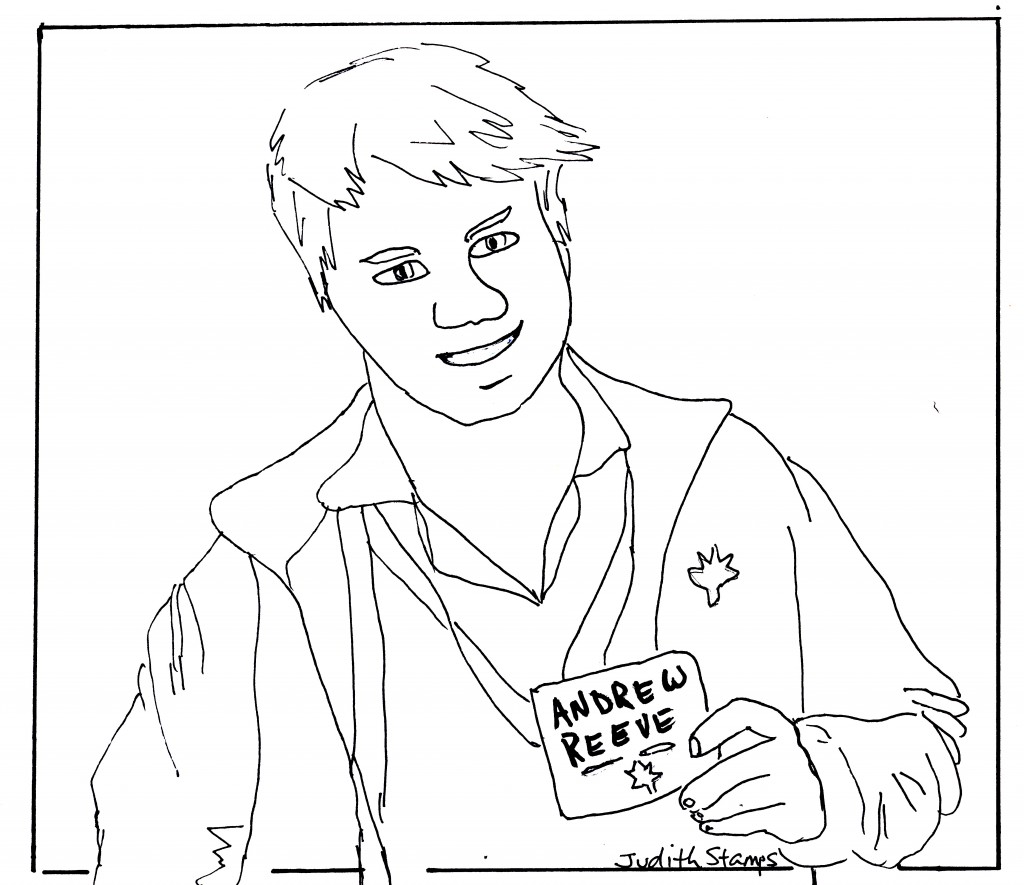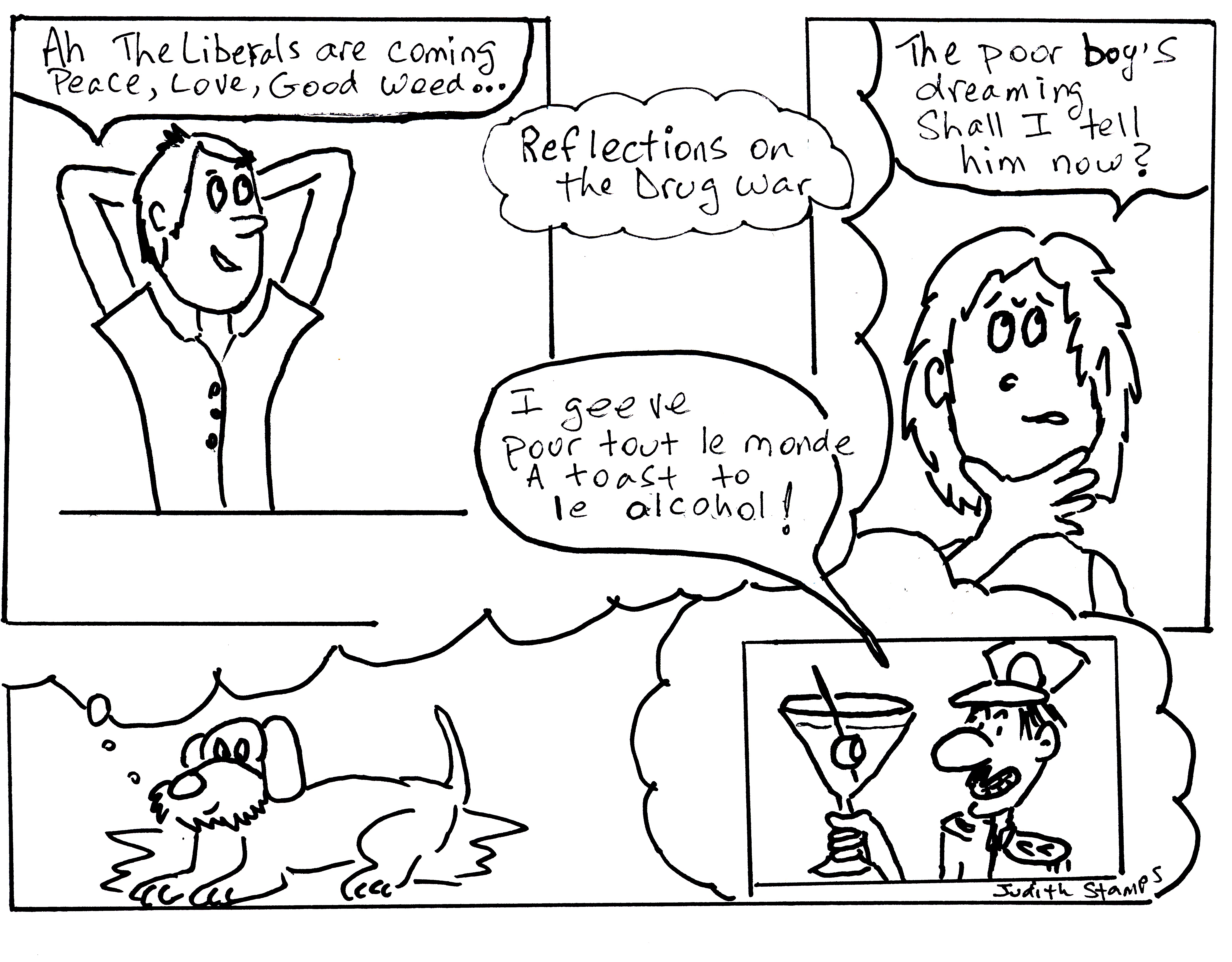
On May 2, 2011, the Liberal Party of Canada (LPC) suffered the worst defeat in its political history. Having won 34 out of 308 federal seats, the party found itself knocked into third place for the first time. It had a mere 19% of the vote, and held only 4 seats west of Ontario. For many it was a profound shock, raising for the first time the question of the party’s survival. One Canadian thus affected was Andrew J. Reeve, a 19 year-old political science student at the University of Victoria. Reeve was a middle of the road pragmatist, and did not want to see his party of choice die. If no one got involved, it just might die. At least he thought so. That year, he joined the Young Liberals, attended the party’s provincial convention in November 2011, held in Victoria BC, and became involved in a manner he could hardly have predicted. Based on an interview with Reeve earlier this week, this is the story of how a policy to legalize marijuana rose to prominence, and went on to become a part of the LPC’s platform.
[su_pullquote align=”right”]Copps explained to the group that there was a good chance this policy would never be debated. It was comprehensive and well thought out, and many agreed with it in principle. But the party was in survival mode, and far too many feared that such a policy would hurt its chances. [/su_pullquote]Attending the same conference was Sheila Copps, 61 year-old-veteran of Canadian politics. Copps had served as federal MP from 1984 to 2004, and was the first Canadian woman ever appointed as deputy prime minister. She was running that year to be president of the LPC. Although she lost the race to Mike Crawley, she may have helped Canadians to win something at least as significant. On the second evening of the convention, Copps invited around 35 members, including Crawley, to her hotel suite to talk policy. One of the policies up for debate at the 2011 convention was Policy 117, a plan for legalizing, regulating and taxing recreational marijuana in Canada.1 It had been formulated at some point earlier in 2011. Copps explained to the group that there was a good chance this policy would never be debated. It was comprehensive and well thought out, and many agreed with it in principle. But the party was in survival mode, and far too many feared that such a policy would hurt its chances. Thus far it had very little support. Moreover, the schedule was crowded. Plenary sessions, during which proposals come to a vote, are three hours in length, and there is never time to consider everything on the schedule. In Copps’ view, if present company wanted to see this idea debated, they would have to find a way out of this funk.
As the evening wore on, debaters began to drift away, joining social circles in a variety of the hotel’s hospitality rooms. Five stayed on. They were Russ Miller, currently vice president of the LPC in Vancouver East; Lindsay Amantea, now a law student in Alberta; Lewis Rhodes, at present studying to be a teacher; Andrew J. Reeve, who has gone on to become president of the LPC in Victoria, and a fifth person whose name Andrew could not recall. At some stage in their discussion, they asked themselves this. Why can’t we create the support for this idea here and now? Why not hammer out a new policy, find enough members to sign it as proof of support, and get it onto the floor that way? The five were well equipped for this task. Amantea had done a paper on addiction for a university class, and had a handle on the statistics. Others had equally useful knowledge to share. Reeve had good writing skills. For the next couple of hours, the group’s ideas flowed, and he crafted the language for a brief, on the spot policy. Amantea turned the policy into a document on her laptop, and the hotel staff printed copies for them.

Paper in hand, they strode off to find supporters. At this hour, well after midnight, the convention had dissolved into a series of wine and cheese parties, located in various suites and hospitality rooms, in two different hotels. Reeve took the lead. He approached individual revelers, and pitched a thirty-second promotion on the policy’s merits: it was the right thing to do; it was evidence-based, not ideological; it would free law enforcement to focus on real crime; it would cut down on gangs; and the substance was not harmful. If partygoers were at all receptive, he handed them his pen and said: “Just sign this on my back.” He repeated this routine in elevators, hallways and reception rooms. He got around fifty signatures, a sufficient number by the groups’ calculations, and crawled away for a few hours of sleep. Early the next morning, Amantea submitted the signed sheets to the convention co-chairs. The plan worked. People were impressed by the group’s effort, and the signatures provided a clear show of grass roots support. At this point, the group ceded discussion time to the original, Policy 117. Their own quickly drafted version had been instrumental in demonstrating support, but the original was far more detailed and generally a better document. Policy 117 was presented at the plenary session later that day, discussed, and approved with a generous show of hands. Reeve retired to his room and crashed for eighteen hours.
He would need the rest, as there was still much to do. The next stop in the policy’s journey was the LPC’s national convention, held in Ottawa in January 2012. It was an expensive trip for a student, but Reeve had a stake in the outcome. He attended. He was surprised and pleased to find that BC had the second largest delegation there. First place went, predictably, to Ontario. There was lively debate. There were the usual concerns. Would this policy brand the party? Could it harm youth? A former police officer spoke persuasively in its favour. So did others. At the end of the day, via electronic vote, Policy 117 was approved by 77% of the members. By LPC rules, party leaders can still veto such a policy. They didn’t. Interim leader, Bob Rae, supported the plan and in 2013, so did Justin Trudeau. The foresight of a senior politician, and the drive supplied by five young BC Liberals, had given Canadians an official federal party policy to legalize, regulate and tax marijuana.
But official or otherwise, the question remains. What now? If elected, would the LPC make this happen? Reeve is optimistic. One consequence of the party’s severe setback has been a profound change in its demographic. After 2011, much of the old order drifted away and the party had to be rebuilt. Much of the new order is comprised of younger Canadians. Reeve is a prime example. At 22, he is the second youngest Federal Liberal Riding President in Canada, in his case, for Victoria. He points out that at the LPC’s BC convention held at Whistler, BC in November 2013, Young Liberals counted for just below 50% of the participants. “This is not,” he notes, “your grandfather’s Liberal Party.” It surely is not. The question is: would the new, youthful order spell the end of the Machiavellian world of realpolitik?
To illustrate this point, let me tell you another, much sadder story. It’s the one about the Liberal Party’s 2003 attempt to decriminalize simple possession of marijuana in Canada. The Bill (C-10) was to have been part of the legacy of Prime Minister Jean Chretien, who was set to retire in 2004.2 It is generally believed that C-10 died because Canada crumbled under US pressure. It did, but not without a plot from within. Three Liberal backbenchers, Brenda Chamberlain, Roger Galloway and Dan McTeague, opposed decriminalization. They apparently opposed the Canadian tradition of party discipline too. Soon after C-10 was introduced, without consulting anyone, they contacted and met privately with American deputy Drug Czar, Barry Crane. Chamberlain encouraged Crane to put pressure on the Canadian Government, and asked that the US be more vocal in its opposition. They provided him with an internal memo outlining the Bill’s the weaknesses. A Canadian Department of Foreign Affairs official was also in attendance, and it is thanks to his subsequent memo that we know of this event at all. Jack Layton later accused the group of gross misconduct, but nothing much happened.3 So yes, Canada bowed to external pressure…after being stabbed by its own.

But times change, and a new order is set to take the stage. The new participants, as Reeve suggests, are not jaded. An untried, youngish Party is a beacon of hope. But it is difficult not to worry about the attitudes of the older MPs, the 23% that voted ‘no,’ and the 56 Conservative senators, now a majority. What are they thinking? The House stands presently at 308 seats. For the next election, officially slated for October 2015, this number will be increased to 338. We will see a lot of rookie candidates. If the LPC is successful, it is to be hoped that its MPs will develop a new level of co-operation and good will. For Andrew J. Reeve, who stood at the centre of a policy whirlwind, the historic signatures stand as a sign of good things to come. As a token of his belief, he kept the pen, and still has it.
Judith Stamps. June 29, 2014
[su_posts id=”2632″ posts_per_page=”1″ tax_operator=”0″ author=”16″ order=”desc”]
[su_note note_color=”#cbffb5″]
1. https://bc.liberal.ca/files/2013/01/DRAFT-Marijuana-Policy-Paper-Jan-13.pdf
2. http://www.parl.gc.ca/Content/LOP/researchpublications/prb0433-e.htm
[/su_note]




